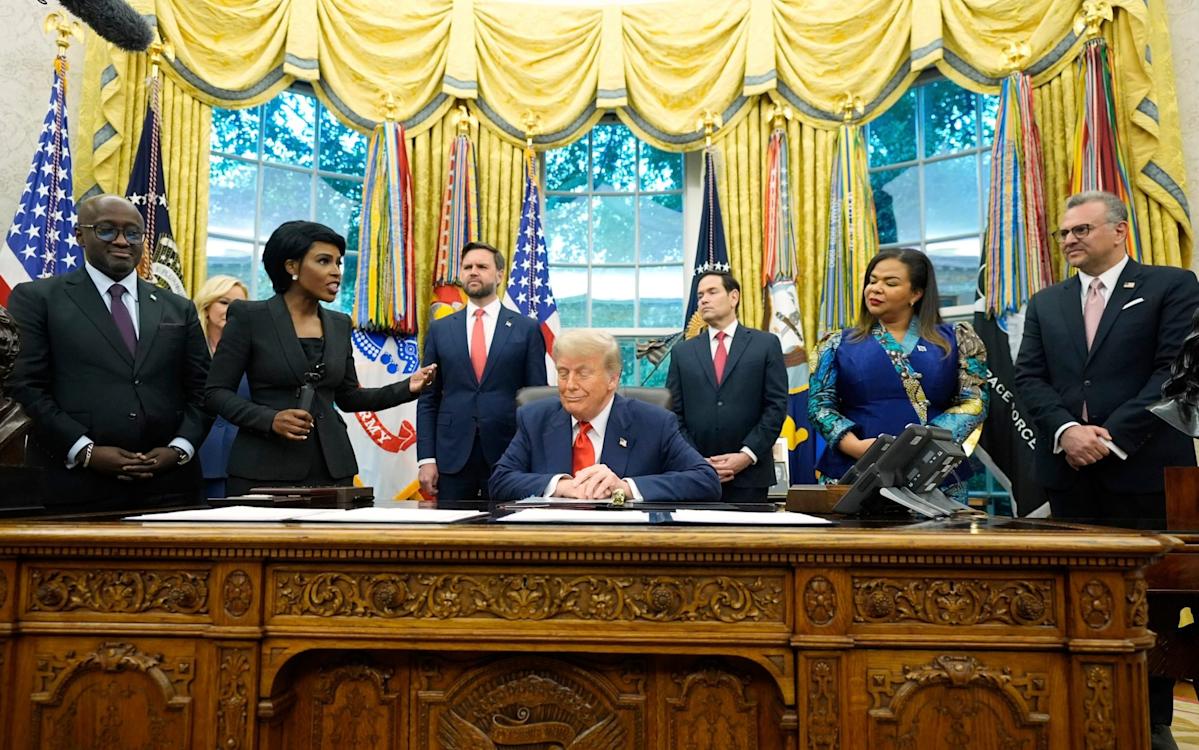Rwanda and the Democratic Republic of Congo (DRC) signed a peace deal Friday aimed at ending decades of deadly conflict – a move which Donald Trump has claimed credit for.
The two countries pledged to pull back support for guerrillas, with the US-brokered deal demanding the “disengagement, disarmament and conditional integration” of armed groups fighting in eastern Congo.
The US president, flanked by JD Vance, the US’s vice-president, and Marco Rubio, the secretary of state, said that the peace treaty was “a glorious triumph”.
“Today, the violence and destruction comes to an end, and the entire region begins a new chapter of hope and opportunity,” Mr Trump said as he welcomed the two nations’ foreign ministers to the White House. “This is a wonderful day.”
The deal comes after the M23, a Tutsi rebel force linked to Rwanda, raced across the mineral-rich east of the DRC this year, seizing vast amounts of territory, including the regional capital Goma, the city of Bukavu and two airports. Thousands were killed and hundreds of thousands forced to flee following the offensive.
However, the agreement does not explicitly address the gains of the M23 in the area torn by decades of on-off war, instead calling for Rwanda to end the “defensive measures” it has taken. Rwanda denies supporting the M23 despite overwhelming evidence.
Previous peace deals in the region have failed and crucial questions also remain unanswered. They include whether the M23 will withdraw from the areas they have seized, if Rwanda admits having troops in eastern DRC and withdraws them, and if thousands of Congolese people will be allowed back from Rwanda.
Experts have also stressed that while the deal could mark a turning point in the long-standing conflict between M23 rebels and Congolese forces in the eastern provinces of North and South Kivu, large parts of the country remain plagued by violence and instability.
In Ituri, a province in the north-west of the country, a patchwork of armed groups made up of varying ethnic groups continues to clash over territory and resources. Both Uganda and Rwanda have been accused of involvement in the conflict, which has displaced more than 100,000 people since the beginning of 2025, according to the UN.
“We hope that this deal could bring lasting peace to the DRC and spread beyond just North and South Kivu, but we know it will take time,” Dr John Agbor, the UNICEF representative for the DRC told The Telegraph.
“We’ve seen a huge increase in grave violations against children in the last year […] rates of recruitment and use of children as soldiers, sexual violence, maiming, and killing. And it’s not only North and South Kivu, this is across all of the DRC.
“There are six provinces in active conflict in the DRC, until peace is brought everywhere only then can we bring real and impactful difference to the lives of children,” Dr Agbor added.
While the US president admitted that he “didn’t know too much about” the conflict and that it was “a little out of my league”, he added that the United States will be able to secure “a lot of mineral rights from the Congo”. The DRC has enormous mineral reserves that include lithium and cobalt, vital in electric vehicles and other advanced technologies.
The deal had been negotiated through Qatar since before Mr Trump took office, but the US president also started his White House event by mentioning a journalist who said he deserved the Nobel Peace Prize. The US president is widely believed to want to win the award, and has frequently criticised its awarding to his predecessor Barack Obama.
Last week – before the US bombed Iran and later negotiated a ceasefire – Mr Trump unleashed his frustration on that front.
“No, I won’t get a Nobel Peace Prize no matter what I do, including Russia/Ukraine, and Israel/Iran, whatever those outcomes may be, but the people know, and that’s all that matters to me!” he wrote on Truth Social.
The new agreement drew wide, but not universal, praise. Antonio Guterres, the UN secretary-general, called the deal “a significant step towards de-escalation, peace and stability”. Germany hailed the “excellent news”, and Emmanuel Macron, the president of France, praised the “historic step forward”.
However others – including Denis Mukwege, a gynaecologist who received the 2018 Nobel Peace Prize for his work to end the DRC’s epidemic of sexual violence in war – also criticised the agreement, saying it effectively benefits Rwanda and the United States.
The deal “would amount to granting a reward for aggression, legitimising the plundering of Congolese natural resources, and forcing the victim to alienate their national heritage by sacrificing justice in order to ensure a precarious and fragile peace,” Mr Mukwege said.
